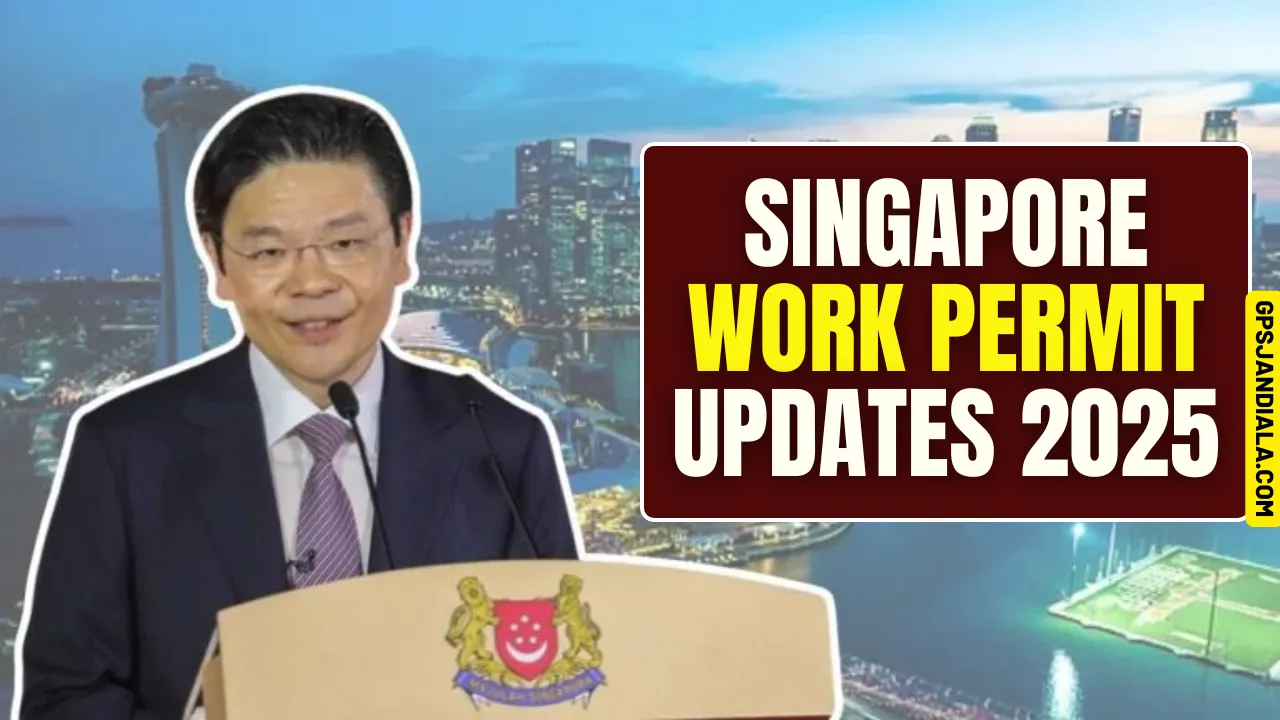Singapore Work Permit Updates 2025: Singapore is introducing new regulations for work permits in 2025, affecting both foreign workers and businesses. These changes aim to ensure a skilled workforce while supporting local talent development. The updates include revised minimum salary requirements, changes in levy rates, and adjustments in eligibility criteria. For employers, the new regulations mean higher labor costs, while foreign workers will need to meet stricter salary thresholds to qualify for work permits.
The government’s goal is to attract skilled professionals while encouraging businesses to invest in local talent. This article covers the main aspects of the Singapore work permit updates 2025, including salary thresholds, levy rates, eligibility criteria, and their impact on both employers and foreign workers.
Overview Table: Singapore Work Permit Updates 2025
| Aspect | Details |
| Minimum Salary for S Pass (General) | SGD 3,150 per month (rising to SGD 3,300 from September 1, 2025) |
| Minimum Salary for S Pass (Finance) | Higher than general sectors |
| Basic Levy Rate (Tier 1) | SGD 650 per month (increased from SGD 550) |
| Tier 2 Levy Rate | SGD 650 per month (unchanged) |
| Effective Date for New Salary Rules | September 1, 2025 |
| Authority | Ministry of Manpower (MOM), Singapore |
| Objective | Attract skilled talent while supporting local workforce |
Revised Minimum Salary Requirements
Starting in 2025, the minimum salary requirement for S Pass holders will increase to SGD 3,150 per month for most sectors. From September 1, 2025, this threshold will rise further to SGD 3,300. For individuals seeking employment in the financial services sector, the salary requirement will be higher due to the specialized nature of these roles.
These adjustments aim to ensure that foreign workers receive competitive wages while aligning their salaries with the upper one-third of local Associate Professionals and Technicians. The salary increase reflects Singapore’s commitment to attracting skilled professionals who contribute to the country’s economic growth. By raising salary thresholds, the government seeks to maintain a competitive job market that offers fair compensation to both local and foreign workers.
Adjustments in Levy Rates
Alongside the salary increases, employers will face higher levy rates for hiring S Pass holders. Effective from September 2025, the Basic or Tier 1 levy rate will rise from SGD 550 to SGD 650 per month. The Tier 2 levy rate will remain unchanged at SGD 650 per month.
Levy rates are fees that employers must pay for each foreign worker they hire. The increase in these rates is designed to encourage businesses to hire and develop local talent while still allowing them to access foreign professionals when needed. For employers, this change means higher labor costs, making it essential to review their workforce strategies to manage expenses effectively.
Impact on Employers
The updated regulations will affect businesses, particularly small and medium enterprises (SMEs) that rely on foreign workers. With higher salary thresholds and increased levy rates, employers may face challenges in managing operational costs. These changes may prompt businesses to explore alternative solutions, such as:
- Automating processes to reduce reliance on manual labor.
- Investing in training and upskilling local employees.
- Streamlining workforce distribution to optimize costs.
While the changes may lead to higher short-term expenses, they are intended to support Singapore’s long-term economic goals by promoting a skilled and competitive workforce. Businesses that adapt to these regulations by developing local talent and improving productivity will be better positioned for future growth.
Economic Objectives of the Updates
The Singapore government’s decision to revise work permit regulations is driven by its goal of building a skilled and resilient workforce. By increasing salary thresholds and levy rates, the government aims to:
- Attract highly skilled foreign professionals who can contribute to economic growth.
- Ensure that foreign workers receive fair wages, aligned with local salary levels.
- Encourage businesses to hire and develop local talent, reducing reliance on foreign labor.
These measures are designed to maintain a balanced labor market that meets the needs of employers while supporting the long-term development of Singapore’s workforce.
Impact on Foreign Workers
For foreign workers, the new regulations present both opportunities and challenges. The higher salary thresholds mean that those who meet the requirements will receive better compensation. However, the increased cost burden on employers may lead to stricter hiring processes, making it essential for foreign workers to enhance their qualifications and skills.
To remain competitive in the job market, foreign workers should focus on developing their professional expertise and gaining experience in high-demand sectors. By meeting the new salary requirements and demonstrating their value to employers, they can improve their chances of securing employment in Singapore.
Eligibility Criteria for S Pass Applicants
To apply for an S Pass in Singapore, foreign workers must meet the following eligibility criteria:
- Hold a valid job offer from a Singapore-based employer.
- Possess the necessary qualifications and work experience for the role.
- Meet the minimum salary threshold for their sector (SGD 3,150 per month, increasing to SGD 3,300 from September 1, 2025).
- Applicants in the financial services sector must meet a higher salary requirement.
Employers are responsible for submitting S Pass applications on behalf of their employees and ensuring compliance with all regulations.
Application Process for Work Permits
The application process for work permits involves several key steps:
- Job Offer: The employer provides a formal job offer to the foreign worker.
- Application Submission: The employer submits the S Pass application through the Ministry of Manpower (MOM) online portal.
- Document Verification: MOM reviews the application and verifies the applicant’s qualifications, experience, and salary details.
- Approval and Issuance: If approved, MOM issues the S Pass, allowing the foreign worker to legally work in Singapore.
- Medical Examination: The foreign worker must undergo a medical examination upon arrival in Singapore.
Employers should ensure that all required documents are submitted accurately to avoid delays in the application process.
Compliance and Renewal Requirements
Both employers and foreign workers must comply with MOM regulations to maintain the validity of work permits. Key compliance requirements include:
- Ensuring that foreign workers receive the minimum salary specified for their sector.
- Paying the appropriate levy rates for each foreign worker employed.
- Renewing work permits before they expire, typically every two to three years.
- Providing a safe and fair working environment for foreign employees.
Failure to comply with these regulations can result in penalties, including fines, suspension of work permits, and restrictions on hiring foreign workers.
FAQs About Singapore Work Permit Updates 2025
What is the new minimum salary for S Pass holders in 2025?
The minimum salary for S Pass holders will be SGD 3,150 per month, increasing to SGD 3,300 from September 1, 2025. The financial services sector will have a higher threshold.
How much is the levy rate for hiring foreign workers?
The Basic or Tier 1 levy rate will be SGD 650 per month, up from SGD 550. The Tier 2 levy rate will remain at SGD 650 per month.
When do the new salary requirements take effect?
The revised salary requirements will apply to new S Pass applications starting from September 1, 2025.
How will these changes impact employers?
Employers will face higher costs due to increased salary thresholds and levy rates. This may lead businesses to invest in automation, upskill local talent, and optimize workforce distribution.
What should foreign workers do to meet the new requirements?
Foreign workers should enhance their qualifications and professional skills to meet the higher salary thresholds and remain competitive in the job market.
Conclusion
The Singapore work permit updates for 2025 aim to create a skilled and competitive workforce while supporting local talent development. By raising minimum salary thresholds and adjusting levy rates, the Ministry of Manpower seeks to attract skilled foreign professionals who contribute to the country’s economic growth.
For employers, the changes mean higher labor costs and the need to explore alternative workforce solutions. Foreign workers must meet stricter salary requirements, making it essential to enhance their skills and qualifications. By adapting to these regulations, businesses and workers can navigate the evolving labor landscape and contribute to Singapore’s long-term economic success.








